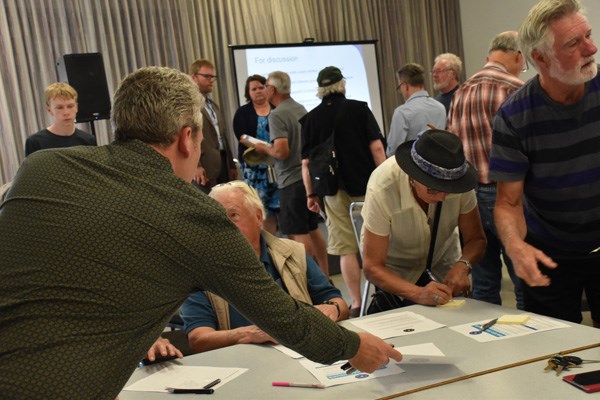Climate change was largely blamed for the Sunshine Coast’s ongoing water shortage at Monday’s town-hall style meeting in Sechelt, but the audience focused mainly on how development, meters and conservation rules and tactics fit into the picture.
Gibsons and Sechelt mayors and council, Sunshine Coast Regional District (SCRD) directors and at least one shíshálh Nation councillor attended the packed meeting at the Sechelt Legion, which was billed as an event “to learn about SCRD water supply projects, drought management, water conservation, climate change and more,” according to a release about the event.
During the first half of the two-hour session, SCRD infrastructure manager Remko Rosenboom spoke candidly about the scope of the crisis, which involves an anticipated water deficit of 1.65 million cubic meters by 2025 if water use is reduced by 20 per cent compared to 2010 levels. He referred to that shortage as “an enormous amount of water,” while calling the lower-than-normal snowpack levels in the Chapman watershed this season “scary.”
Making things grimmer is the abnormally warm and dry long-range summer forecast, making a declaration of Stage 3 and 4 outdoor water restrictions likely and necessary “to keep water running out of the taps in late summer, early fall.”
“We’re not alone. All over the world communities are struggling with the pace that climate change is impacting us,” he said, before covering off the conservation and supply projects underway at the regional district to address the issue.
When it was the audience’s turn to speak, water conservation regulations, worsening drought, desalination plants, and logging in the watershed were among the sampling of questions funnelled to Sechelt Mayor Darnelda Siegers, SCRD chair Lori Pratt and Rosenboom, but one question about development on the Coast elicited the biggest reaction.
“It would seem to me that the demand, as long as you’re approving new development, is going to increase, in addition to the drastic nature of climate change causing the lack of water. So I’m wondering if you can put that into your consideration since it seems so absent,” said one audience member.
In response, Rosenboom referenced his presentation, which showed that even though the Sunshine Coast’s population is growing at 1.4 per cent – less than the SCRD’s two per cent projections – summer water consumption is decreasing. “I fully acknowledge your point,” he said but the rate of growth “in the short term [is] not causing us any concern in terms of the strict mathematics of the water supply deficit.”
The speaker then, supported by the crowd, persisted with her rebuttal.
“If you’re considering a new building with two times 42 units as being not very significant, then why should we bother to conserve?” Applause tailed the question.
Siegers replied that developments currently being approved won’t be built before new water supplies are in commission, and that Sechelt council will be discussing the issue. “We are having to look at do we continue to approve developments in Sechelt given that we have the most development happening on the Sunshine Coast,” she said, adding that it becomes more difficult since some developments, such as a long-term care facility, are badly needed on the Coast.
Another speaker suggested governments could look at curbing commercial users, such as hotels and bed and breakfasts.
Pratt also acknowledged the development issue. “We are having that conversation because we have heard what you have said through the election period as well as on social media since then.”
People were also given the opportunity to provide input directly to politicians and staff and as written submissions.
Another session was planned for the Sechelt Legion on June 4 from 7 to 9 p.m. and at the Gibsons Legion on June 5, from 7 to 9 p.m.



